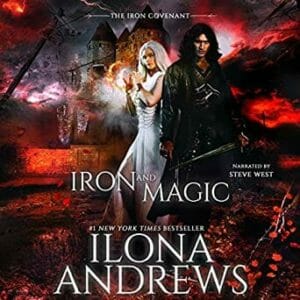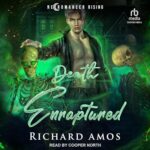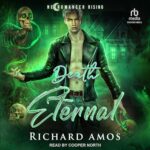 Narrated by Steve West
Narrated by Steve West
With the popular and long-running Kate Daniels series drawing to a close, Ilona Andrews has begun a new series set in the same world, featuring one of the major secondary characters from those books. Iron and Magic is the first in the Iron Covenant series, and takes, as one of its principal characters, Hugh d’Ambray, the villain from the Kate Daniels series. When I picked up a review copy of the book several weeks ago, I hadn’t realised it was a spinoff, and when I found out, was worried I might not be able to follow the story. Fortunately, however, those concerns were unwarranted; I asked a friend for a bit of background, but otherwise, this book works fairly well as a standalone, and there is enough information and backstory given for the newbie not to feel lost.
Hugh d’Ambray had, for almost his entire life, enjoyed a position of peculiar privilege as the right-hand-man of Roland, the god-like being who rules the magical world. As the Preceptor of the Iron Dogs, Hugh was warlord, assassin and enforcer; but when we meet him at the beginning of Iron and Magic, his life has been turned upside down. Cast out by Roland, the life he’d known has been ripped away, and he’s in a downward spiral of despair and hopelessness. Deprived of his sense of self, no longer certain of his place in the world and no longer immortal, Hugh is not even trying to adapt to his change in circumstances; he’s down for the count and seemingly intent on living at the bottom of a bottle.
A small group of former comrades track him down with the news that Landon Nez – leader of the Golden Legion (lord of all the necromancers – who control vampires) – is systematically wiping out the Iron Dogs, and that there are only around three hundred of them left. This news finally sobers Hugh, who determines to do whatever he can to stop Nez and save the rest of his men. Hugh might be a ruthless killer and there’s no doubt he’s done some terrible things (and those aren’t glossed over – he’s not given a complete personality transplant here) but he’s loyal to his men and they to him; he sets about rounding up the remaining Dogs and then coming up with a plan to keep them all alive and defeat Nez. The most important thing on his ‘to-do’ list is to find them somewhere safe to hide out, regroup and strategize – and the most likely place is a village called Berry Hill in Kentucky, a small settlement on good farming land by a lake, inhabited mostly by families, a few witches and the odd stray druid. The settlement is in need of protection because Roland wants their land (and will resort to underhand means to get it), and the Dogs need somewhere to stay – it sounds like a perfect match. Except that any alliance made with the villagers must be absolutely watertight; the only way to keep Nez at bay is to present a strong, completely united front, and the best way to do that is by the ages-old tradition of marriage.
Once Hugh has recovered from the shock of being told he needs to get married, he realises that he actually has very few other options. The Dogs need food and somewhere to rest, so he decides he might as well meet the prospective bride, Elara Harper – the White Warlock – and see what happens.
Elara and Hugh are both resentful that such a step is necessary and dislike each other on sight – but they agree that marriage is their best option. Elara is clearly possessed of powerful magic, but listeners are left wondering exactly what her powers are, and why her enemies have branded her unclean and an abomination. She and Hugh are very alike in many ways; strong, stubborn, loyal and highly intelligent, they’re both used to calling the shots and being obeyed, so it’s a given they’re going to strike some pretty fierce sparks off each other from the get go.
As the story progresses, we watch the Dogs become part of the village as Hugh and Elara, reluctant allies at first, begin to – if not like each other – then to look upon each other with a grudging admiration and respect. I loved watching them setting aside their differences (mostly) in order to fight a common enemy, and the battle and fight sequences are really well done – some of them a bit gruesome maybe, but nothing fans of the genre are unlikely to have come across before. The plot is well-constructed, with plenty of action, mysticism and magic, and the two central characters are strongly-drawn and compelling. I said earlier that Hugh isn’t miraculously redeemed or given a personality transplant; he’s still ruthless, violent (when called for) and will do whatever is necessary to ensure victory, but this time, he’s making his own decisions and fighting for a cause he believes in – the people he cares about and who depend on him for protection. But it’s not easy. Even though he’s finally come to understand the extent to which Roland manipulated him, and even though he is making a new life on his own terms, it’s clear he’s still struggling with the loss of his old life and feelings of abandonment.
We don’t really get to know much about Elara here (I believe we’ll learn more in the next book), although it’s clear that she’s a strong leader, who is as determined to do the best for her people as Hugh is for his. She and Hugh have strong chemistry, and by the end of the book they’ve reached a truce of sorts. I’m eager to see how things are going to progress.
I may have squealed with joy when I learned Steve West had signed up to narrate Iron and Magic. I’ve enjoyed Mr. West’s work in the past and I know he’s a fabulous narrator, so I was sure I was in for a treat – and I wasn’t wrong. His narration is excellent; well-paced, clearly differentiated and subtly nuanced, he imbues his performance with the right degree of expression throughout, whether it’s a quietly introspective moment, an innuendo-laden exchange between Hugh and Elara or a full-blown battle scene. It’s not explicitly stated in the text that Hugh is British (not in this book – maybe someone familiar with the series can tell me if this is the case?), but Steve West is a Brit, and performs the narrative and Hugh’s dialogue in his natural accent, adopting a variety of others – American, African, Middle-Eastern, Italian – where required. His interpretation of Hugh is spot on – dangerous, authoritative (and sexy as hell!) – and I liked the softer, measured-yet-steely tones he employs for Elara. His female voices are good overall, and the American accent he adopts to portray Elara sounds accurate to my British ears; he doesn’t go over the top or push it too far, and he adds a touch of colour by utilising local/regional accents for some of the supporting characters.
Iron and Magic is a thoroughly entertaining, action-packed story featuring a well-matched and compelling central couple. The growing attraction between Hugh and Elara is well realised, but it’s very much in the early stages and I’m sure it will develop as the series progresses. Fans of Ilona Andrews will need no persuasion to pick this one up, and if, like me, you’ve never listened to one of their stories before, rest assured – you’re in for a great listen.
Caz
Buy Iron and Magic by Ilona Andrews on Amazon




I’m glad to hear you like the narrator as I was disappointed they did not choose Renee Raudman for this series and his reviews were mixed at Audible.
I’ve never listened to Renee Raudman, so I
can’t make a comparison. I actually bought this solely because of Steve West – I read and reviewed the book when it first came out and hadn’t planned on revisiting in audio, but changed my mind when he said on Twitter that he’d narrated it. As this is a hero-centric novel, it makes perfect sense to me to use a male narrator.
Do you think the mixed reviews are simply because people expected Ms.Raudman and didn’t want to listen to someone different? Because it’s an excellent performance – IMO, of course :)
You very well could be right people were so used to R.R. that they were biased from the beginning against Steve West. It’s actually something I’m struggling with myself, but I do understand why they chose a male to narrate a hero-centric book. The biggest problem I have are reports that he gives Andrea and Raphael Italian accents. Just no, they are from the south! They do play a relatively small part in this book, which I’ve read and now want to listen to, so I hope I can bear that blasphemy. :) Avid listeners of the Kate Daniels series will better understand my horror at the thought. LOL
I believe he does give them European-sounding accents (not heavy ones) – not having read the earlier books, I didn’t know they weren’t Italian! I get that this can be a problem and I’m sure, had I been familiar with the other series, that I’d have noticed, too. It’s a tricky problem, although I’d have thought it something that the authors should have noted in their pre-production notes? A couple of authors I know who self-publish their audiobooks always include information like that for their narrator.